Richard Henry Pratt informs the Commissioner of Indian Affairs that funds promised in previous correspondence have not yet been received. Pratt warns that, if the funds are not received soon, he will be unable to meet recruited students at Winfield, Kansas as previously arranged.
1879
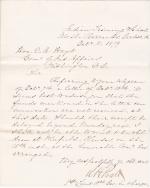
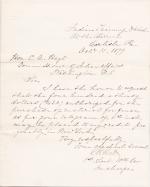
Request from Richard Henry Pratt for $430 of previously authorized funds to be credited to his account, for the construction of a fence at Carlisle Barracks.
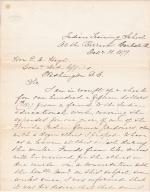
Richard Henry Pratt writes to Commissioner of Indian Affairs Ezra Hayt for instructions on how to process donations received for the Carlisle Indian School. Pratt notes that he received a donation for the continued education of a former prisoner-of-war held at Fort Marion in St. Augustine, Florida. He requests specific instructions on how or…
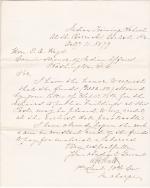
Superintendent Richard Henry Pratt requests that the Commissioner of Indian Affairs transfer $1332.50 of approved funds to Pratt's control for repairs to buildings at the Carlisle Barracks.
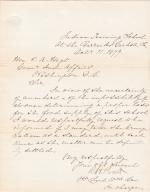
Superintendent Richard Henry Pratt writes Commissioner of Indian Affairs Ezra Hayt regarding food costs for Indian students. Pratt suggests that, until a proper standard is established, the Army ration rate be adopted and provided to him as a food allowance for the pupils.
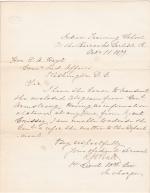
Richard Henry Pratt forwards to Commissioner of Indian Affiars Ezra Hayt a telegram sent by General Samuel Armstrong of the Hampton Institute. Armstrong telegrams Pratt asking whether he (Armstrong) is needed for a recruitment trip to Dakota, and Pratt forwards the telegram to the Commissioner for consultation.
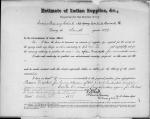
Richard H. Pratt submits an Estimate of Supplies for the fourth quarter of fiscal year 1879 amounting to $2,361.91 and requests to purchase those items in the open market. The form includes the items being requested, the quantity, the estimated cost, and how the item will be used at the school.
Note: This item was copied from U.S.…
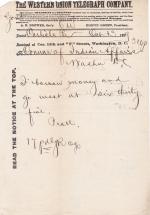
Telegram from Richard Henry Pratt informing the Commissioner of Indian Affairs that he is borrowing money for his travel west, and will be leaving that day.
Note: Previously approved funds had not yet been made available to Pratt, despite numerous requests to the Commissioner. Pratt was traveling to Winfield, Kansas to meet up with…
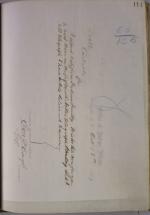
Telegram from the Commissioner of Indian Affairs Ezra Hayt to Richard Henry Pratt which informs Pratt that sixty people are expected to come to Carlisle from Indian Territory.
Hayt asks if Pratt will be able to meet this party on October 15th (in Winfield) or if Alfred J. Standing should be telegraphed instead. He promises that he…
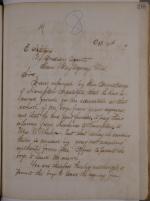
Letter from Commissioner of Indian Affairs Ezra E. Hayt to Indian Agent E. Stephens at Green Bay Agency authorizing him to recruit two Menominee boys from Keshena to go to Hampton Institute, payment for which had already been sent along to Mrs. W. Wheeler from General Armstrong. Hayt also suggests that he might meet up with Indian Agent Charles…
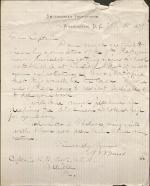
Spencer Fullerton Baird of the Smithsonian Institution writes to Richard Henry Pratt discussing how Pratt found the Carlisle Barracks site when establishing the school. Baird also encourages Pratt's son to use a scholarship to Dickinson College.
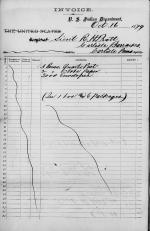
Richard H. Pratt signs an invoice confirming that the Commissioner of Indian Affairs sent him a large shipment of letter paper, note paper, and envelopes.
Note: This item was copied from U.S. National Archives microfilm reels (M234), which were filmed from the original documents found in Record Group 75, Entry 79, "Letters Received by…
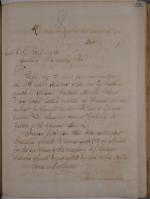
Commissioner of Indian Affairs Ezra E. Hayt's suggests that letters sent by the children cannot be classed under the head of official correspondence, and therefore those letters should not use "official" stamps." Hayt does encourage letter writing and tells Pratt to provide an estimate for the purchase of U.S. postage stamps.
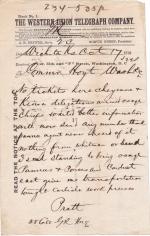
Richard Henry Pratt telegrams the Commissioner of Indian Affairs, noting that no tickets were on deposit for recruited Cheyenne and Kiowa students met in Wichita, Kansas. Pratt also notes that the Osage did not receive enough information about the request for students, and that the Pawnee and Ponca agents had not heard about the request. Pratt…
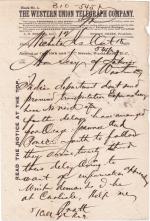
Telegram from Richard Henry Pratt to the Secretary of the Interior, pleading for the provision of immediate transportation of recruited students from Wichita, Kansas to Carlisle. The Indian Office had failed to provide transportation for the students in time, necessitating Pratt's plea.
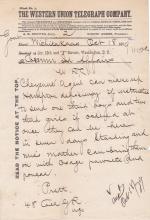
Richard Henry Pratt telegrams the Commissioner of Indian Affairs, informing him that the Cheyenne agent can supply students to make up the deficiency of students at Hampton, and should be instructed to send one third boys and two third girls. Pratt notes that these students could be escorted east by Alfred Standing and Sarah Mather, two…
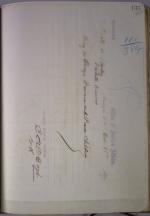
Telegram from Commissioner of Indian Affairs Ezra Hayt sent to Richard Henry Pratt or Alfred J. Standing. (Hayt did not know who was at Wichita, Kansas to receive the telegram.)
The telegram reads: "Bring on Osage, Pawnee, and Ponca children."
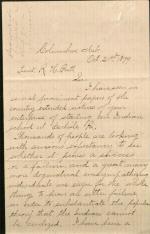
Marianna Burgess writes to Richard Henry Pratt inquiring about a position as teacher at the newly formed Carlisle Indian School. Burgess provides details on her background, and offers to help recruit Pawnee children to attend Carlisle.
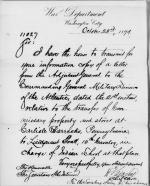
The Chief Clerk to the Secretary of War forwards a letter to the Secretary of the Interior. The letter, from Adjutant General E. D. Townsend, explains that the Secretary of War has authorized the transfer of Commissary property and stores at the Carlisle Barracks to the Department of the Interior.
Note: This item was copied from U.S.…
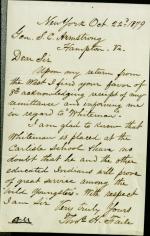
Samuel Chapman Armstrong of the Hampton Institute writes to Richard Henry Pratt discussing a recent conversation with Commissioner of Indian Affairs Ezra Hayt, and forwards a letter (on the reverse side of the page) to Armstrong from Thomas H. Fraile about Whiteman's placement at Carlisle.
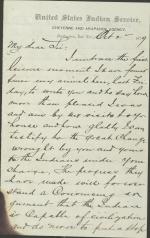
Charles E. Campbell, the acting agent for the Cheyenne and Arapaho Agency, writes to Richard Henry Pratt praising him for his work educating the Fort Marion prisoners of war, and giving him an update on recruitment efforts for Carlisle.
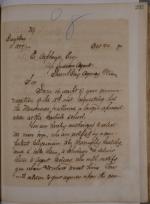
Letter from Commissioner of Indian Affairs Ezra E. Hayt to Indian Agent E. Stephens authorizing the selection of two more Menominee boys to be sent to the Carlisle Indian School. Hayt instructs Stephens to ensure their health is certified by a competent physician and then to rendezvous with Indian Agent Charles Crissey in Chicago.
…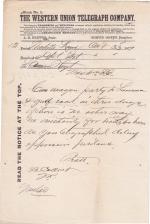
Telegram from Richard Henry Pratt to Commissioner of Indian Affairs Hayt noting that the party of recruited students met in Wichita can be waggoned to Lawrence, Kansas if need be. Pratt again notes that he is desperate for a way to transport the pupils back to Carlisle.
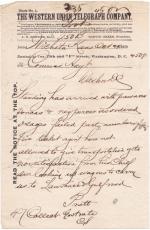
Telegram from Richard Henry Pratt to Commissioner of Indian Affairs Hayt noting that Alfred Standing has met up with him in Wichita, escorting Pawnee, Ponca, and Nez Perce students. Pratt notes that he is investigating the possibility of using wagons to transport the pupils to the Lawrence and Gulf railroad line, as he cannot secure enough…
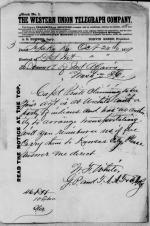
W. F. White informs the Commissioner of Indian Affairs that Richard Henry Pratt is at Wichita with a party of Indians but has no authority to arrange transportation. White asks the Commissioner if he will reimburse him if he transports Pratt and his party to Kansas City.
Note: This item was copied from U.S. National Archives microfilm…
